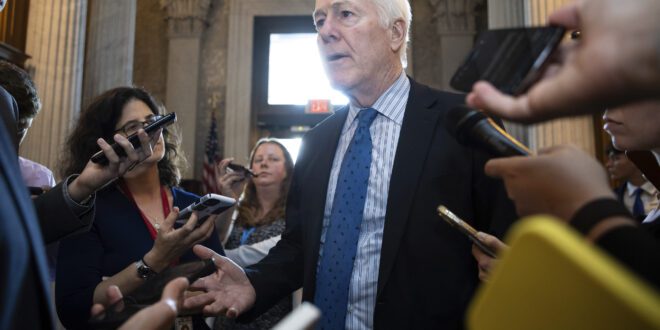Introduction
Any new oversight or regulation for financial activity overseas would be a break from decades of U.S. policy that largely allowed American firms free rein in other nations. The issue is where — and how — to draw the line between permissible investments in the Chinese economy and those that could fund companies or technological advancements that assist Beijing’s military rise.
Proposed Amendment to Senate’s Defense Authorization Bill
Some Republicans have advocated proposals that would make U.S. firms notify federal agencies of investments in a series of Chinese tech sectors like microchips and AI. Sens. John Cornyn (R-Texas) and Bob Casey (D-Penn.) have proposed an amendment with that language to the Senate’s annual defense authorization bill, which is slated for a floor vote on Tuesday.
Bipartisan Support for the Amendment
Their amendment, which is a scaled back version of the stand-alone legislation the pair have pushed for years, has bipartisan support, including from Senate Majority Leader Chuck Schumer, who gave it his backing earlier this week. House Democrats on the Ways and Means and Appropriations committees, as well as former Trump trade chief Robert Lighthizer, have called for legislation that hews closer to the original Cornyn-Casey bill, which would allow the government to block certain deals.
Challenges and Compromises
Cornyn said he still supports a stronger bill as well, but that it can’t win sufficient support with colleagues who oppose tighter business regulations. He and Casey agreed to scale back their language further this week after pushback from lawmakers like Senate Banking ranking member Tim Scott, who objected to the scope of the bill and wanted fewer Chinese sectors to fall under government scrutiny.
The Biden Administration’s Executive Order
The Biden administration is also expected to set up an oversight process for U.S. investment in China in a long-awaited executive order, expected as soon as this month, which could prohibit business deals in the semiconductor, quantum computing and artificial intelligence sectors. That order has been delayed for more than a year as administration officials grapple over which industries should be subject to oversight — and whether the government should have the power to block deals outright, or should only require notification of what it considers risky investments.
Republican Perspectives on the Proposed Legislation
But even the scaled back Cornyn-Casey bill goes too far for some House Republicans, who view a new notification requirement as a slippery slope to the kind of heavy-handed government intervention one might see in China. Republicans on the House Financial Services Committee are taking a different approach — advocating for legislation that would block U.S. investment in a specific list of Chinese firms.
A member of the House’s China Select, Foreign Affairs and Financial Services committees, Barr said he has beefed up his own legislative proposal in recent weeks in an effort to get more of his hawkish colleagues on board. The updated legislation, which Barr has not yet released, would direct federal agencies that maintain corporate blacklists, such as the Commerce Department and Pentagon, to prioritize sanctions on certain Chinese tech sectors.
Hope for Consensus and Further Legislation
Even if Republicans on that panel can coalesce on Barr’s bill, many in his party want to go further in the future. Gallagher and the other Republicans recognize that their legislative agendas are on a collision course, but all expressed hope that they could come to an agreement in the coming months — either in a conference committee on the defense bill, or through another vehicle.
“My own preference would be to have a construct that’s stronger than Casey-Cornyn but we’re still working on that with the committees of jurisdiction,” Gallagher said. “I understand that time is running out but I’m cautiously optimistic that we can come to a common understanding.”
 Mind Uncharted Explore. Discover. Learn.
Mind Uncharted Explore. Discover. Learn.




